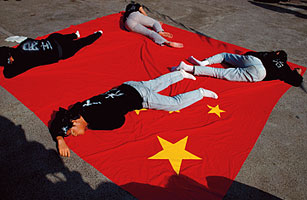
The five flagpoles that stand in front of the Star Ferry terminal at the tip of the Kowloon peninsula in Hong Kong have long been a popular meeting place. It was at this familiar spot 20 years ago that democracy advocates sold commemorative items to raise money for the victims of the June 4 crackdown at Beijing’s Tiananmen Square. I bought one: a four-inch plastic replica of the Goddess of Democracy statue that had been erected at the square. For a 9-year-old trying to make sense of the world, that keepsake was a concrete link to the revolutionary scenes spanning the globe during that eventful year.
I knew very little about the politics energizing millions of people from Berlin to Budapest to Beijing. Beyond TV images and conversations with family and friends, I had no conception of the grievances that would lead to the demolition of the Berlin Wall, would bring about multiparty elections in Hungary or caused crowds to gather in Tiananmen. But even a child could sense that the times were momentous.
Hong Kong encourages an astute sense of politics among its residents, who are, by Chinese standards, well informed, not least because they enjoy unrestrained access to global news and political commentary. That Hong Kong was, in 1989, an undemocratic British colony with a seething communist giant as a neighbor merely taught people to pick their battles carefully — in itself a valuable political skill — and they saw Tiananmen as a cause worth the agitation. The principal of my primary school, who addressed us soon after the Tiananmen drama unfolded, warned us to ignore the protests and the marches, saying, “You’re kids — what do you know about politics?” He was adopting the stance of an anxious educator, but he did not represent the moral tone of the city — not then, not now.
Today, Tiananmen seems forgotten in mainland China, or else it is seen as a blip on the march to prosperity. In Macau, the annual remembrances are almost invisible events